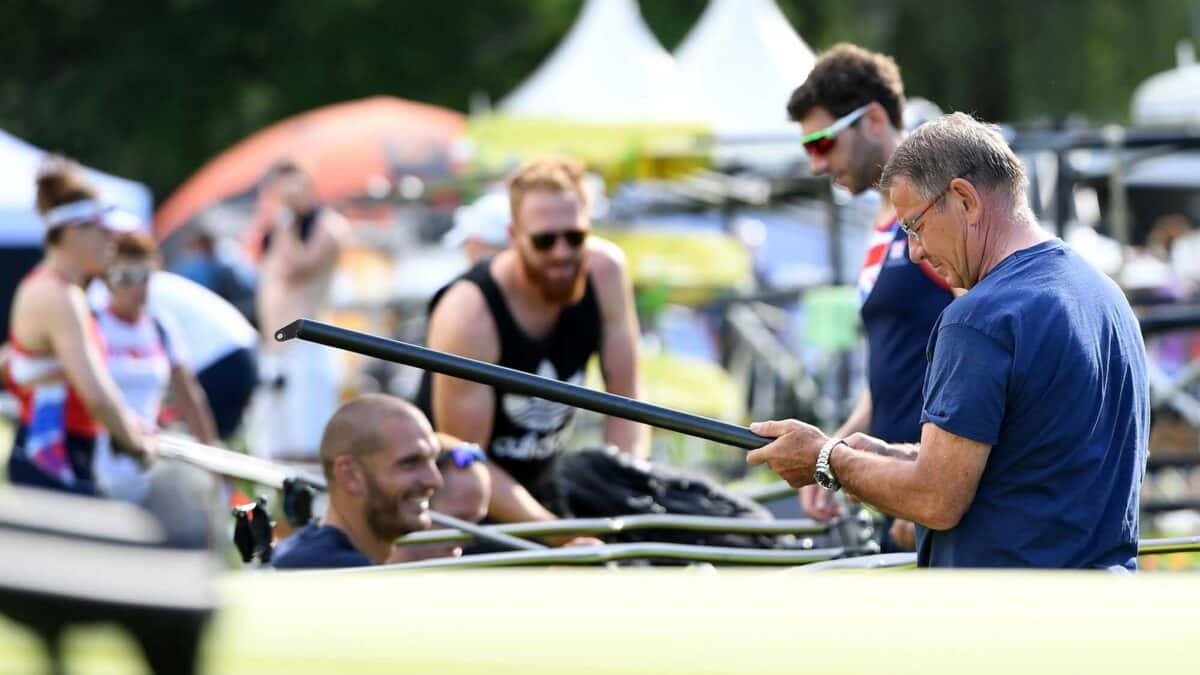
24 Dec 2018
Coaching the Juergen Grobler way – More Power
‘More Power’ is a new book about one of rowing’s greatest coaches. It is a story spanning half a century following the life of Juergen Grobler from his rise within the once unstoppable East German (GDR) juggernaut to his transformational leadership of Great Britain’s recent decades of success.
World Rowing spoke about the book and Grobler’s long – and still on-going legacy – with Christopher Dodd, who coauthored the book with British Olympic medalist, Hugh Matheson.
Having watched the success of Grobler’s GDR crews, Dodd, a long-time writer for Great Britain’s Guardian newspaper and founder of the Henley-on-Thames’ River and Rowing Museum, has developed an association with Grobler since he arrived in Britain in the early 1990s.
“I went to interview him on his first day,” says Dodd, who served for many years as editor for British Rowing’s Regatta Magazine (now Rowing and Regatta Magazine). “Every December, I would have lunch with Juergen in his club (Leander) to do a piece on how the men’s squad were doing.”
“He didn’t obviously tell me everything. Every year I would ask him: ‘what about doing a biography?’ and every year he would say: ‘no, no, wait until I retire’. A couple of years ago we were still having these meetings and I finally said, ‘well, you are not going to retire’.”
From there, the book began to come together. As for Grobler himself, Dodd says that Great Britain’s chief coach remained characteristically quiet when it came to staging a formal interview for a biography. Yet the legacy of Grobler’s exceptional career along with years of conversations with the man himself provided Dodd and Matheson with a compelling story to tell.
At far as systems go, the East German sport machine was unmatched in their pursuit of Olympic gold by any means possible. “There was money and for the top athletes and coaches, all the best, everything you could want,” says Dodd.
“Once all that collapses, he takes a job in a country that ranks 45th in the world overall but has the two best oarsmen around at that time (Steven Redgrave and Matthew Pinsent).”
Grobler’s arrival in Britain heralded not only a change in the system in which he worked, but was also one aspect of wider changes taking place within British rowing and British sport as a whole. Dodd points to the Atlanta 1996 Olympic Games, Grobler’s second Games coaching rowers in Great Britain as a major turning point.
“In Atlanta, Britain only won a single gold medal and that was in rowing in the men’s coxless pair.” Changes in government support to rebuild Britain’s elite sport apparatus soon followed; thanks to Grobler’s success with Redgrave and Pinsent, rowing was well placed to benefit and grow.
When it comes to the core ingredient to Grobler’s unparalleled run of gold medals – at least one for each of the ten Olympic Games he has attended between Montreal 1976 and Rio 2016 – Dodd provides some insight.
“He is a very good psychologist,” Dodd says. “He is very good at judging what somebody’s limit is. He brakes people down to the line.”
“There is a great quote from Alex Gregory,” he continues: “‘you are safe in the knowledge that your coach knows where your edge lies – and you know that you would not stop in an Olympic final’. That is the result that Juergen gets. The oarsman knows that Juergen knows that the oarsman won’t give up.”
While Britain’s strength is not what it was in the lead up to Rio, Dodd would be reluctant to bet against Grobler’s winning ways. “Going on the past record,” he says, “I wouldn’t write off a gold medal in Tokyo.”

